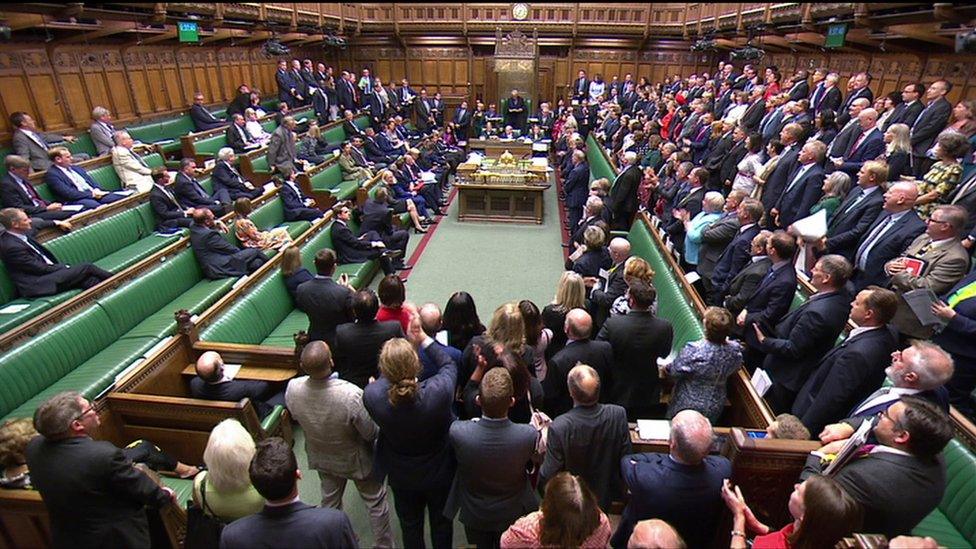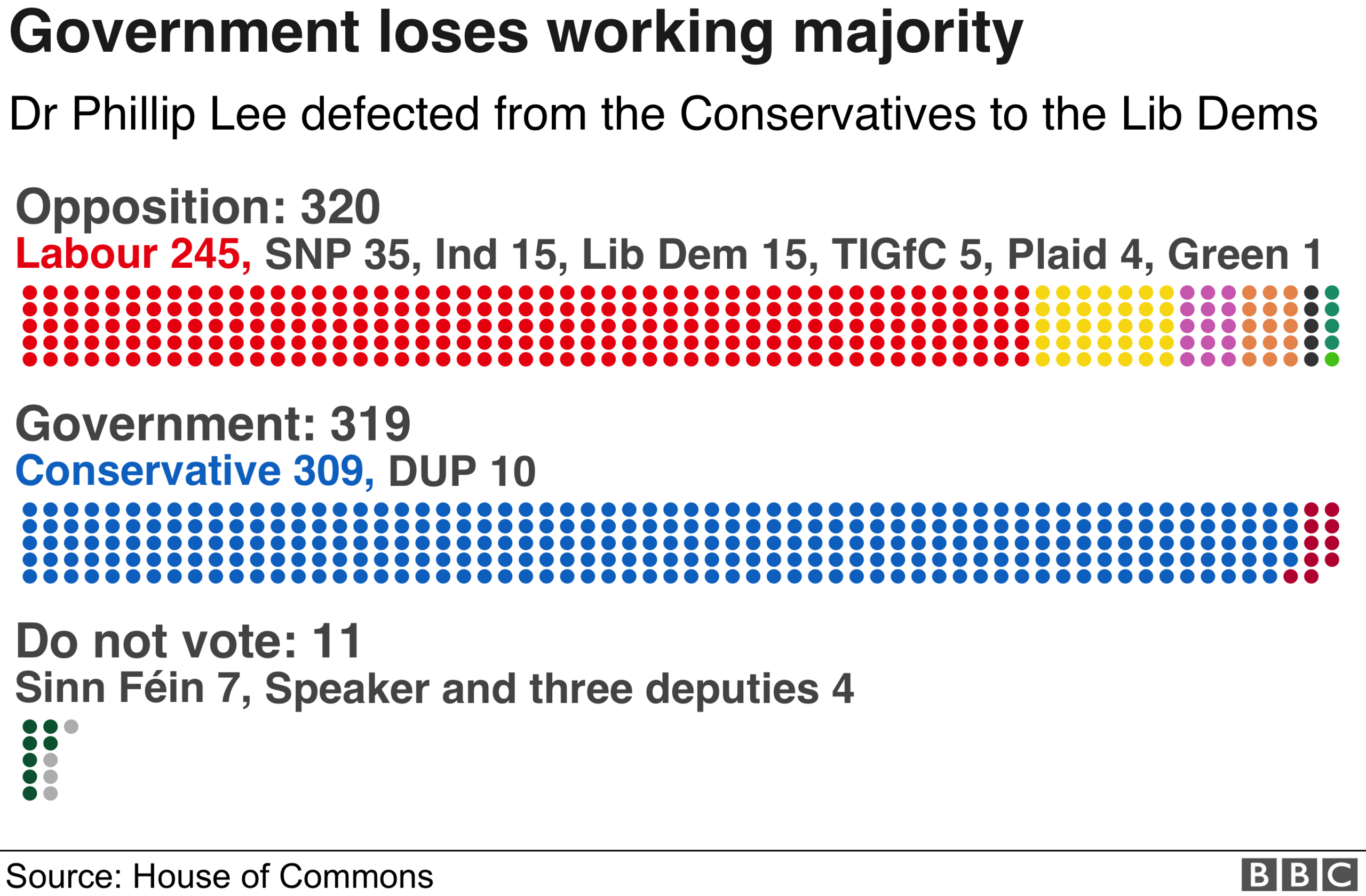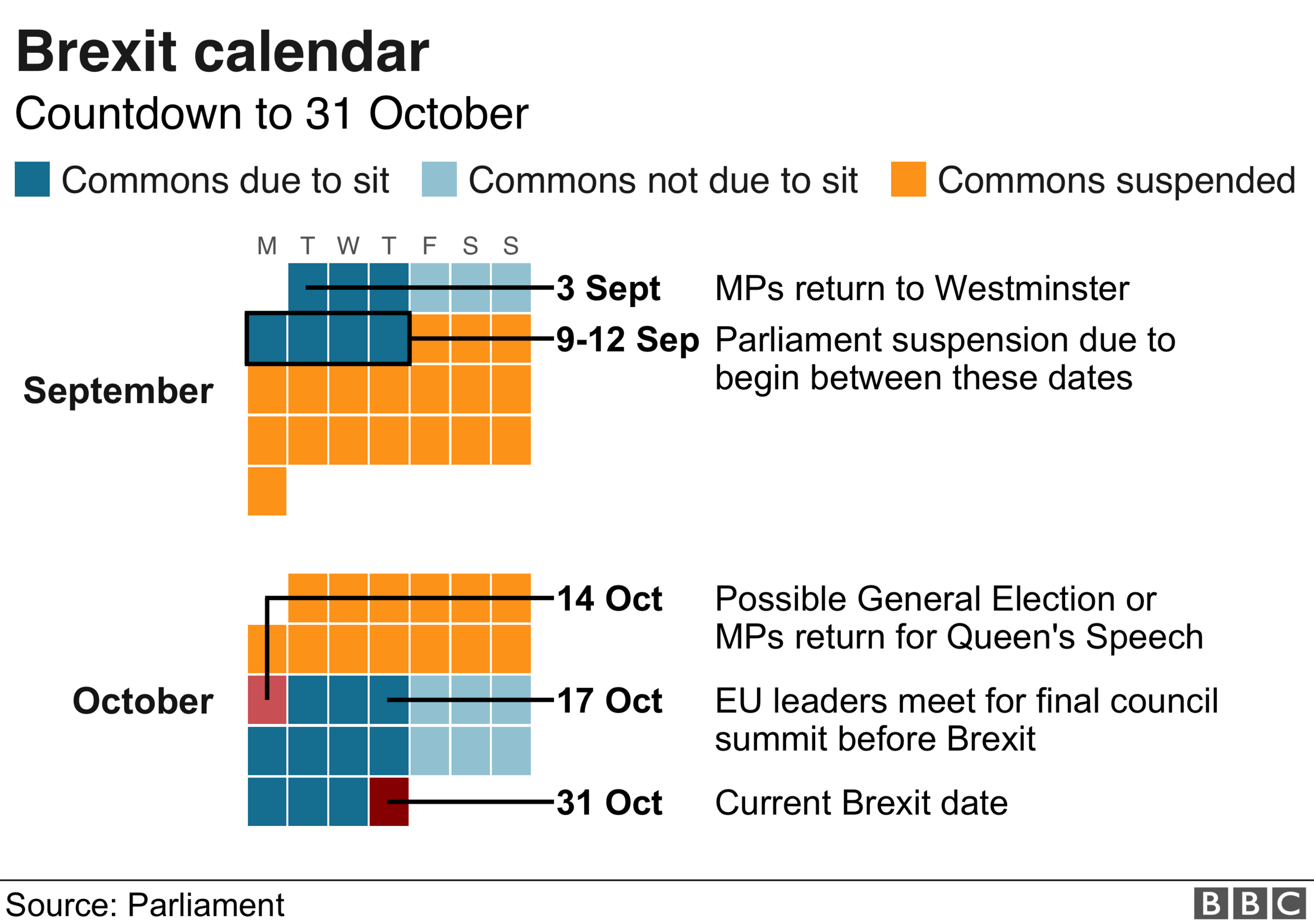Brexit: No-deal opponents argue for Commons control
- Published

Tory rebels and opposition MPs have cleared the first hurdle in their attempt to pass a law designed to prevent a no-deal Brexit.
Commons Speaker John Bercow granted them a debate and a vote on taking control of the Commons agenda.
If successful, they would be able to bring forward a bill seeking to delay the UK's exit date beyond 31 October.
No 10 officials have warned the prime minister will push for an election if they succeed.
The government is expected to table a motion to hold one on 14 October, arguing that if no deal is taken off the table there is no point in carrying on with negotiations with the EU.
Whip removed
The emergency debate - granted under a Commons rule to allow urgent discussion - can last up to three hours, with the main vote expected about 22.00 BST.
If the MPs win the vote - defeating the government - they will be able to take control of business on Wednesday.
That will give them the chance to introduce a cross-party bill which would force the prime minister to ask for Brexit to be delayed until 31 January, unless MPs approve a new deal, or vote in favour of a no-deal exit, by 19 October.
The government had warned Tory MPs they would face expulsion from the party if they backed the bill, and even before the vote, BBC Newsnight's political editor Nicholas Watt said the chief whip had started calling declared rebels into his office to make good on the threat.
Earlier, Conservative MP Phillip Lee defected to the Liberal Democrats ahead of the Commons showdown.
His defection means Boris Johnson no longer has a working majority.
In a letter to the prime minister, Dr Lee said Brexit divisions had "sadly transformed this once great party into something more akin to a narrow faction in which one's Conservatism is measured by how recklessly one wants to leave the European Union".
Sir Oliver said a no-deal would be a "threat to our country"
More than 10 Conservative MPs rose to their feet in support of the emergency debate application, moved by colleague Sir Oliver Letwin.
MPs are asked to stand to show their support if there are audible objections in the Commons chamber.
Opening the debate, Sir Oliver said this week would be the last for Parliament to block a no-deal exit, before it was due to be suspended next week.
Mr Johnson wants to suspend business for five weeks ahead of a Queen's Speech - setting out a new legislative programme - on 14 October.
Sir Oliver said the PM had "no credible negotiating strategy" and no deal was a "threat" to the UK that must be averted.
John Bercow: I will facilitate the House of Commons, 'do or die'
Labour leader Jeremy Corbyn urged MPs to support the move, also arguing it would be the "last opportunity" for Parliament to block a no deal.
"If we don't take action today, we may not get another chance," he said, adding the government had set the country on a "destructive" course.
But Commons leader Jacob Rees-Mogg criticised the Speaker's decision to allow the vote on the Commons agenda, arguing it was "constitutionally irregular".
He added that the decision "risks subverting Parliament's proper role in scrutinising the executive".
However, he said the government would follow any legislation passed by MPs, telling them: "This country is a country that follows the rule of law."
Mr Bercow responded to Mr Rees-Mogg's criticism by stating that his desire was "simply to seek to facilitate the House... and I will do that to the best of my ability, to coin a phrase, 'do or die'".

Last-ditch efforts to get the Tory rebels on side have been taking place, but there are thought to be about 15 who have not been won over.
The government had hoped the threat of an election - and of deselection and expulsion from the party - would be enough to bring them into line.
To call an election under the Fixed-term Parliaments Act, Mr Johnson would need support from Labour as he requires the backing of two-thirds of the UK's 650 MPs.
Shadow foreign secretary Emily Thornberry said Labour wanted an election, but "at a time of our choosing, and not on a wing and a prayer offered us by Boris Johnson."
She said he could not be trusted to stick to a mid-October date for an election, and might instead change the date until after the Brexit deadline.
Earlier, the PM's spokesman insisted it was simply wrong to suggest that the date of polling day could or would be changed.
The government says it wants a negotiated exit from the EU, but insists the UK must leave in all circumstances by the latest deadline of 31 October.

Earlier, Mr Johnson told the Commons he would travel to Dublin on Monday for discussions with Irish Prime Minister Leo Varadkar, focused on proposed alternative arrangements to the Irish border backstop - a key sticking point in the negotiations.
But he said that if MPs succeeded in their plan to block no deal, it would force him to go to Brussels to "beg for another pointless delay" to Brexit and he would "never" do that.
"It is Jeremy Corbyn's surrender bill. It means running up the white flag," he added.
In a no-deal scenario, the UK would immediately leave the EU with no agreement about the "divorce" process.
Opponents believe it would harm the economy, cause severe disruption to travel and supplies of goods like food and medicine, and lead to a hard border on the island of Ireland.
Proponents insist, though, that any disruption would be short-lived and could be managed with careful preparation.


It seems right now - although there is still some arm twisting going on behind the scenes - that the government is set to lose the vote.
We are finding ourselves in the middle of a full-throttle confrontation between a Parliament that does not want to allow the country to leave the EU without a deal and a prime minister who secured his place in power promising he would always keep that as an option.
Both of them cannot be the victors here.
And they are both determined to win.

Elsewhere, in Edinburgh, a judge has heard arguments over the prime minister's plan to shut down the UK Parliament.
A cross-party group of parliamentarians wants a ruling at the Court of Session that Mr Johnson is acting illegally.
And, in another legal challenge against his suspension plan, the High Court has given former Conservative Prime Minister Sir John Major permission to provide a written contribution to the judicial review sought by campaigner Gina Miller.
BBC legal affairs correspondent Clive Coleman said this gives a boost to Ms Miller's case.